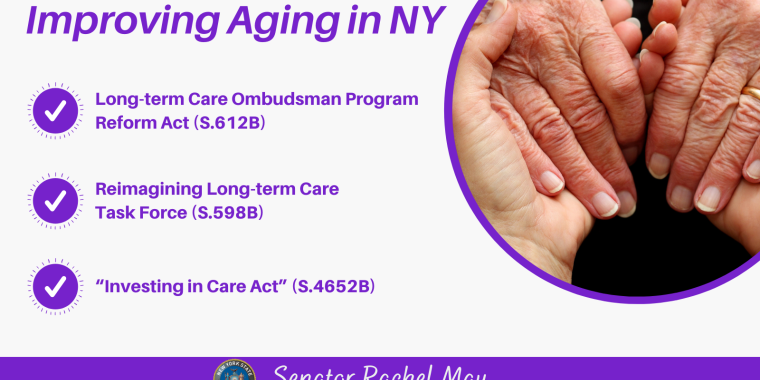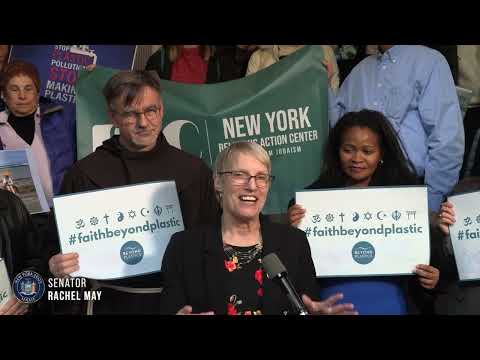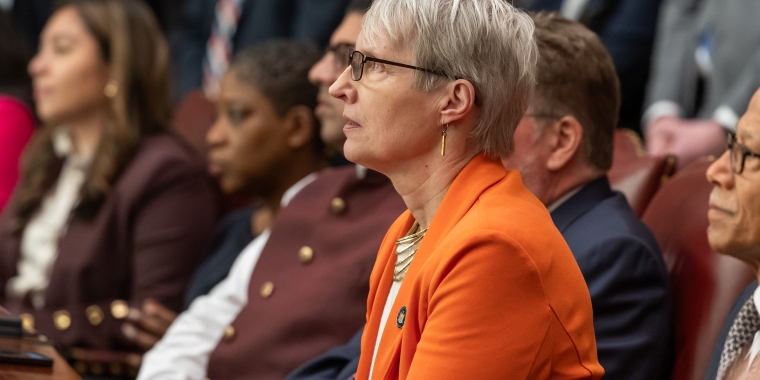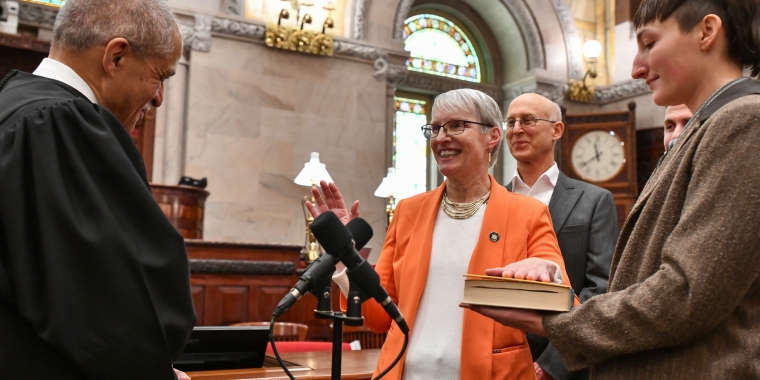Senator May Announces Three Long-term Care Bills Signed into Law
December 23, 2021
-
ISSUE:
- Long-Term Care
- and Homecare
-
COMMITTEE:
- Aging

Syracuse, NY - Today, Senator Rachel May (D-Onondaga, Madison, Oneida) is proud to announce that three of her bills to address issues facing the long-term care system have been signed into law.
“This devastating pandemic is a wake-up call for New York to finally address systemic challenges that have plagued our elder care systems for too long,” says Senator May. “Staff shortages, caregivers forced to work multiple jobs to make a living wage, lax infection controls, chronic funding issues, lack of transparency and oversight -- these and other issues increased the vulnerability of older New Yorkers to this deadly virus, especially those living in nursing homes. We have a critical opportunity -- and a responsibility -- to rethink the whole system of long-term care in a way that truly prioritizes the needs of older New Yorkers and those who care for them.”
The bills are:
- The Long-term Care Ombudsman Program Reform Act enhances the Long Term Care Ombudsman Program (LTCOP) program in several ways. The bill requires enhanced two-way communication between the Department of Health and LTCOP staff and volunteers. This measure would address concerns that LTCOP volunteers and staff are often kept in the dark about the status of complaints or required corrective actions in response to those complaints. While LTCOP volunteers and staff identify issues in facilities, the Department of Health is the regulatory agency charged with responding to reported issues. This communications gap seriously undercuts morale and compromises the perceived effectiveness of volunteers diligently working to be responsive to family and resident concerns. It also has been cited as a likely contributing factor in why the state program-which is heavily reliant on volunteers-has such difficulty retaining adequate numbers of such volunteers to satisfy required visitation benchmarks, as revealed by a state comptroller report in fall 2019. Finally, it also requires that facilities ensure ombuds access as part of their pandemic preparation.
- The Reimagining Long-term Care Task Force will establish a Task Force with representatives from across the long-term care system. The task force will have two goals. First, to examine the impact of the coronavirus pandemic on long-term care in New York State, producing a report on issues like staffing shortages, visitation bans, infection control protocols and enforcement. Second, to make recommendations to the Governor and legislature on how to build a more resilient long-term care system to care for and protect the overall well-being of residents and clients in any future emergency.
- The “Investing in Care Act” proposes a new investment in caregiving. Our traditional approach to economic development -- incentivizing employers to relocate or develop a new business in a part of the state through tax credits and financial incentives -- has delivered mixed results. Often, the promises made fail to deliver on the public's investment. The Invest in Care Act proposes that we rethink economic development in New York State and place a greater emphasis on the needs of the moment: supporting good paying jobs in the caregiving industry that can deliver immediate tenths for our elders, children, and people in need of supportive caregiving of all sorts. By rethinking economic development to emphasize a caring economy and the needs of New York families, we can make an appropriate investment in caregiving and yield immediate results in the form of stronger, healthier communities.
“I am grateful to Governor Hochul for taking a bold step forward today in reimagining how New York does long-term care,” said Senator Rachel May, Chair of the Senate Aging Committee. “Our elders deserve to live in the communities they love, with dignity, for as long as they can, and these bills are a significant step toward helping to ensure they are able to. By reimagining our long-term care system and by laying the foundations for investing in a truly caring economy, we are positioning New York to once again be a leader. And by strengthening the long-term care ombudsman program, we will guarantee that these resident advocates have more tools to help protect nursing home residents. I thank the Governor and Assembly partners for their collaboration on these bills and I look forward to continuing working with them to build a truly age-friendly state.”
# # #


